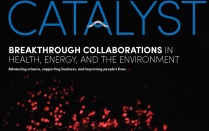Andreadis elected Fellow of the Biomedical Engineering Society
Honor recognizes Andreadis' contributions to the fields of stem cells, molecular bioengineering, tissue engineering and regenerative medicine
by Jane Stoyle Welch
Published February 25, 2017 This content is archived.
Stelios T. Andreadis, a professor and chair of the Department of Chemical and Biological Engineering in UB’s School of Engineering and Applied Sciences, and a member of UB’s Center of Excellence in Bioinformatics and Life Sciences, has been elected as a Fellow of the Biomedical Engineering Society (BMES), the lead society and professional home for biomedical engineering and bioengineering.
Andreadis was honored “for contributions in the fields of stem cells, molecular bioengineering, tissue engineering and regenerative medicine.”
BMES Fellows are nominated by their peers for exceptional achievement and accomplishment in a specific field of interest within biomedical engineering related to research, education, industry, public service, new technology or clinical practice.
“This well-deserved honor is a testament to Stelios’ many achievements,” said Liesl Folks, dean of the School of Engineering and Applied Sciences. “His creativity and dedication to the advancement of our understanding of stem cells has produced ground-breaking results and is reflected in the breadth of his activities as an academic leader, which range from graduate training programs to start-up companies.”
Andreadis’ research interests span a wide spectrum from fundamental to technological to pre-clinical/translational research. He has made pioneering contributions in the areas of stem cell bioengineering; vascular, skin and gland tissue engineering and regeneration; molecular design of biomaterials; protein and gene delivery; and lentiviral arrays for high throughout pathway analysis of stem cell differentiation and reprogramming. He co-founded Angiograft, LLC to commercialize the cell-free vascular grafts that were developed in his laboratory as arterial replacement grafts for treatment of cardiovascular disease.
Most recently, he became the Director of the Stem Cells in Regenerative Medicine (SCiRM) Training Program, which is funded by NYSTEM to train students in stem cell biology and bioengineering and applications of stem cells in regenerative medicine.
His research has received continuous funding since 1999 from organizations including the National Institutes of Health, National Science Foundation (NSF), NYSTEM and private foundations, totaling more than $18 million. Together with his laboratory colleagues, he has published more than 135 peer-reviewed publications and conference proceedings and delivered more than 70 invited seminars. He has advised 24 PhD students, 16 M.S. students, 4 post-doctoral research fellows and more than 40 undergraduate researchers.
Among his numerous accolades, Andreadis received the SUNY Chancellor’s Award for Excellence in Scholarship in 2014, UB’s Exceptional Scholar: Sustained Achievement Award in 2009 and Exceptional Scholar Young Investigator Award in 2003, an NSF CAREER Award in 2000 and the Whitaker Foundation Young Investigator Award in 1999. He was elected to the College of Fellows of the American Institute for Medical and Biological Engineering (AIMBE) in 2009.
His former PhD students hold tenure-track academic positions at institutions including the University of South Florida, IIT Kanpur in India, and The Capital University of Medical Sciences in Beijing, China; post-doctoral positions at top universities such as Harvard, Stanford, Johns Hopkins and the University of Pennsylvania; or research and leadership positions in leading pharmaceutical/biotechnology companies including Shire Pharmaceuticals, Bristol-Myers Squibb, Merck, Biogen, Life Technologies, MedImmune and others.
Andreadis joined the UB faculty in 1998 after serving as a post-doctoral fellow at the Center for Engineering in Medicine at Harvard Medical School, where he worked in the areas of gene therapy for tissue regeneration and regenerative medicine. He received his PhD in chemical engineering from the University of Michigan in 1996.





